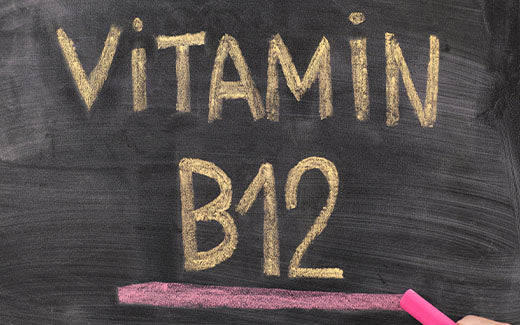The Molecular Blueprint: Cobalamin Unravelled
Vitamin B12, scientifically known as cobalamin, is a water-soluble vitamin and the largest and most structurally complex of all the B vitamins. Its molecular architecture resembles a labyrinthine castle, with a cobalt ion nestled in its core. It's this metallic core that gives the vitamin its signature deep-red hue and unique biochemical properties.
Vitamin B12 core functions
Vitamin B12 plays a pivotal role in various metabolic processes, akin to a conductor leading an orchestra of cellular functions. Some of its most crucial contributions include:
-
DNA Synthesis: B12 is like the architect behind the scenes, assisting in the formation of DNA, the genetic blueprint of life. It enables the proper replication and repair of DNA, which is essential for cell division and growth.
-
Neurological Health: B12 is a diligent guardian of our nervous system, maintaining the integrity of nerve cells and facilitating the production of neurotransmitters. These chemical messengers allow nerve cells to communicate effectively, ensuring seamless cognitive and motor functions.
-
Red Blood Cell Production: B12 is a critical component of the red blood cell assembly line, promoting the synthesis of well shaped, healthy blood cells. It's also an integral cofactor in the formation of haemoglobin, which binds to oxygen and carbon dioxide, transporting them around the body. It's the efficient delivery of oxygen throughout the body that fuels our tissues with life-sustaining energy.
Vitamin B12 absorption and food sources
Despite its vital importance, the human body is unable to produce Vitamin B12. We must acquire this essential nutrient daily through our diet or supplements.
Vitamin B12 is predominantly found in animal-based foods such as meat, poultry, fish, eggs, and dairy products. Some examples of B12-rich foods include:
-
Shellfish: Clams and oysters are particularly rich sources.
-
Organ meats: Liver and kidney contain high B12 levels.
-
Fortified foods: Plant-based eaters can find B12 in fortified cereals, plant-based milk, and nutritional yeast.
However, the absorption of B12 is a convoluted affair. Intrinsic factor, a glycoprotein secreted by the stomach, binds to B12 and this then needs to bind to specific receptors that take the compound across the wall of the small intestine. The production of both intrinsic factor and the receptors is limited and decreases as we age, making it harder to obtain the amount of B12 that we need on a daily basis.
Detecting Deficiency: Warning Signs and Symptoms
A lack of Vitamin B12 can show up in various symptoms, ranging from fatigue and weakness to more severe neurological issues. Individuals with pernicious anaemia, vegans, vegetarians, and those with malabsorption issues are at an increased risk of deficiency. Early detection is crucial, as prolonged deficiency can lead to irreversible damage.
Why Zooki Vitamin B12 ?
Vitamin B12 is an essential nutrient that plays a pivotal role in maintaining our physical and neurological health. As we can neither make nor store it well in the body ourselves, a daily sachet of Vitamin B12 Zooki presents an easy, effective and delicious way to ensure that your body is consistently replenished with one of the key tools for optimal function. By incorporating this convenient supplement into your daily routine, you can take a proactive step towards supporting your body's overall health and well-being.






Share:
A guide to fasting
What are the benefits of Vitamin B12?